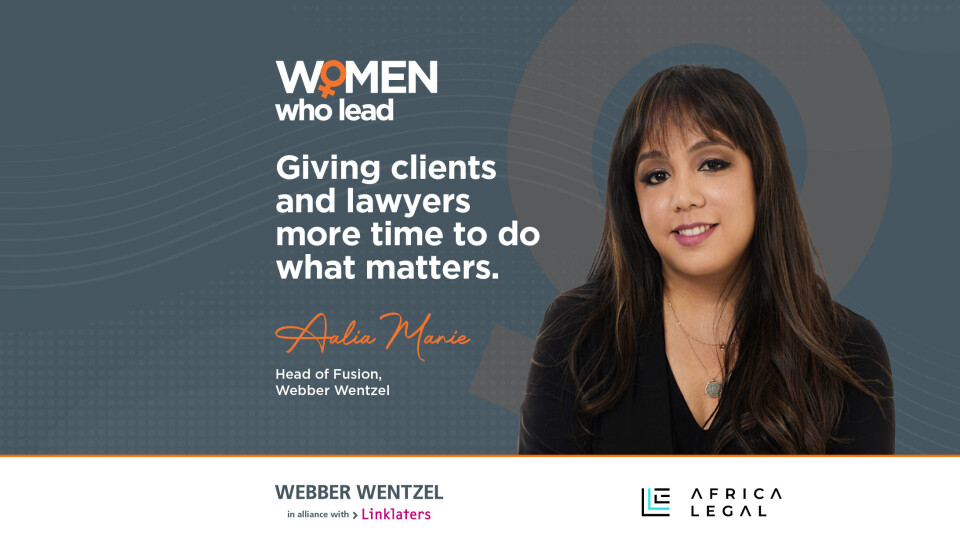Copyright : Re-publication of this article is authorised only in the following circumstances; the writer and Africa Legal are both recognised as the author and the website address www.africa-legal.com and original article link are back linked. Re-publication without both must be preauthorised by contacting editor@africa-legal.com
Giving clients and lawyers more time to do what matters most

Webber Wentzel Fusion blends legal expertise with advanced technology and modern operations to deliver integrated, innovative, and impactful solutions. Aalia Manie discusses how technology is a tool, but people are the core of what they do
While AI is the current buzzword and technology is driving rapid change in society and legal practice, Aalia Manie says the most important thing for lawyers to succeed in a new era isn’t to become a tech whizz, but to ensure they are agile and lean into their distinctly human capabilities..
“If you’re a legal information provider as opposed to a strategist, if you’re only processing information and taking routine actions when delivering on instructions, you’re going to be less valuable than the person who’s thinking about the business, being more insightful and practical, and enabling better outcomes,” says Manie, who heads Webber Wentzel Fusion. “While this has arguably always been the case, AI is making this reality more acute. I like to say to people, ‘be the real human in the room’, and truly engage, because that’s the hardest thing for technology to replace. Our humanness, and all the experience and nuances associated with that.”
A former IP and technology law partner who returned to Webber Wentzel after a few years as COO of a technology scale-up, Aalia now leads a client-facing Fusion team that includes lawyers, engineers, project managers, operations and design specialists, among others. They embrace and harness cutting-edge technology and alternative delivery models to drive innovation, delivering integrated, client-focused solutions that push the boundaries of what is possible in the legal industry.
Yet despite technology becoming increasingly ubiquitous, Aalia herself sees AI and other legaltech as merely a key ingredient, not the whole recipe for success. And practicing what she preaches, she looks for agility and the human factor in her own team, too.
“We think of ourselves as a human-centric team, because I actually think the soft skills are more important,” says Manie, referencing things like resilience, flexibility, adaptability, and emotional intelligence. “There’s a lot of change management associated with all these AI things, and people are fearful, initially. Things become obsolete sooner rather than later. Some of our top technology tools 18 months ago are no longer our top tools, or ways of working. You need to adapt. So those soft skills of understanding people’s wants, needs, incentives, and ambitions, is critical.”
As Head of Fusion, Aalia is looking beyond legal, technological, or ‘new law’ skills, for a willingness to “get in the trenches”, be entrepreneurial, and care about outcomes whether it’s a strategic or administrative task, or anything in between.
“It’s really about the outcome for the client, at the end of the day. So we’re looking for people who care about growth and opportunity for others. General curiosity and creativity. Almost everyone in our team has other hobbies and interests and desires for themselves, and they’re always looking around the corners, attracted to things that are changing, and willing to bring others along with excitement and energy.”
Aalia, who will be speaking later in August at the inaugural Legal Innovation Summit, is thrilled to get to lead in a role that blends her passions for human-centred innovation and her experience in law, technology, entrepreneurship, and design.
“I’m grateful for the opportunity to do it at Webber Wentzel, a law firm whose culture and ways of working I understand deeply, where I have the relationships and institutional knowledge to enable change in a meaningful way.”
While anyone can use the buzz words about innovation or thinking differently, Webber Wentzel invests its money, time, and support in a very real way, she says. With 300% growth over the past 18 months, it’s not just about AI or efficiency, but new thinking, support from partners, and understanding their clients as humans.
Fusion is phase two of the firm’s long-term innovation journey, says Aalia, and at its core - among the technology, innovation, and new thinking - is really about helping lawyers and clients have more time, so they can focus on what matters most.
